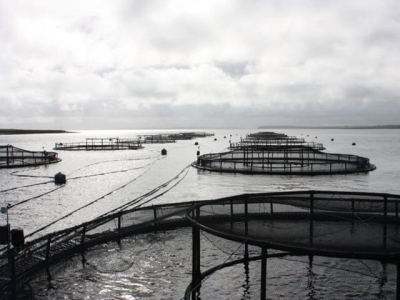Slim pickings for salmon sector

Scottish salmon producers have welcomed a Holyrood committee report on the sector, despite the fact that it reached a number of very negative conclusions about the environmental impact of the industry.
The REC committee concluded that the social and economic benefits of the salmon industry were being offset by environmental and fish welfare issues
Following its in-depth inquiry into the sector, the Rural Economy and Connectivity (REC) Committee has determined that, if the industry is to expand, "there is a need to introduce enhanced and more effective regulatory standards to ensure that fish health issues are properly managed and the impact on the environment is kept to an absolute minimum".
The committee’s convener, Edward Mountain MSP, said: "The salmon farming industry offers significant economic and social value to Scotland, providing jobs and investment in rural areas. There is a desire within the industry to grow. However, if this is to happen, it is essential that the serious challenges it faces such as the control of sea lice, lowering fish mortality rates and reducing the sector's impact on the environment are addressed as a priority. Our report contains 65 recommendations on how this should be taken forward.
"If the reputation of Scottish salmon as a premium product is to be maintained, Scotland's salmon farmers must demonstrate responsible and sustainable production methods. Importantly, the committee is strongly of the view that the status quo in terms of regulation and enforcement is not acceptable, and that we need to raise the bar in Scotland by setting enhanced and more effective standards."
Scope for growth?
According to salmon producers and their representatives there are a number of positives in the report.
Heather Jones, Chief Executive of the Scottish Aquaculture Innovation Centre, said: “The aquaculture sector can now focus its attention on delivering sustainable growth in an increasingly important area of Scotland’s economy. The industry provides thousands of highly-skilled jobs to rural communities and produces a premium global export product to very high standards of environmental protection and fish husbandry.
“Further innovation will be a critical part of how we take salmon farming forward, with SAIC playing a critical role in bringing universities and industry together to maintain Scotland’s position as a pioneer in global aquaculture. Working with the Scottish Government and other stakeholders, we will also continue our work with the delivery of the 10-year Farmed Fish Health Framework which, along with the many research and development projects that are already underway across the country, will support many of the report’s recommendations.”
Julie Hesketh-Laird, chief executive of the Scottish Salmon Producers Organisation (SSPO), said: “We agree with the committee that there is no evidence that salmon farming should not continue to grow sustainably. The Scottish salmon farming sector is at a critical phase of its development and the committee’s recommendation that regulation be improved to keep pace with potential growth is encouraging.”
She also pointed the fact that the prospect of developing larger farms was still a possibility.
“We welcome the committee’s recommendation and the recent move by SEPA to support the development of larger farms. The sector has long called for the flexibility to allow farming in more appropriate locations, while existing farms performing well should be supported to continue in doing so,” she said.
However, the committee deemed "the current level of fish mortalities to be too high in general across the sector and is concerned about extremely high mortality rates at particular sites. It is of the view that no expansion should be permitted at sites which report high or significantly increased levels of mortalities, until these are addressed to the satisfaction of regulators".
Sea lice
Wild fish interests emphasised the regulatory changes recommended by the committee, particularly regarding lice - the committee noted that, "while there has been a variety of actions by the sector to address sea lice infestations, there is still not an effective way to deal with the parasite, and therefore there should be a mandatory approach to the reporting of sea lice infestations". The committee also suggested that the sea lice compliance policy "must be robust and enforceable with appropriate penalties".
Andrew Graham-Stewart, Director of Salmon and Trout Conservation Scotland (S&TCS), said: “Scottish Government has a clear duty to safeguard the coastal environment and those species, including wild salmon and sea trout, that depend upon healthy coastal ecosystems. We applaud the REC Committee’s report, which cuts through many years of Scottish Government and industry spin and prevarication. The onus is now on Scottish Government to act without delay to implement the Report’s recommendations, giving wild fish much needed protection from sea lice and diseases emanating from salmon farms”.
Medication
In terms of other environmental impacts, the committee also noted recent SEPA research which concluded that medicine from Scottish salmon farms "is significantly impacting local marine environments".
"The committee is therefore in no doubt that effective regulation of medicine used by the farmed salmon industry is a key requirement. The committee also considers it to be essential that waste collection and removal from salmon farms is addressed as a matter of urgency," they stated.
Có thể bạn quan tâm
 With animal welfare an emerging consumer concern, fish farmers take stock
With animal welfare an emerging consumer concern, fish farmers take stock Humane treatment of farm animals has become a larger blip on consumers’ radars; the topic is also the subject of growing media and academic interest
 Effects of combining two exogenous carbohydrases on growth of Nile tilapia
Effects of combining two exogenous carbohydrases on growth of Nile tilapia Large amounts of energy-yielding nutrients in plant-based feed ingredients are located in the aleurone layer (which surrounds the endosperm tissue of grass seed
 Immunostimulant additive may boost fish mass, disease survival
Immunostimulant additive may boost fish mass, disease survival Feed additives with immunostimulant properties may provide a survival boost to farmed fish facing a disease challenge and improve biomass, say researchers.